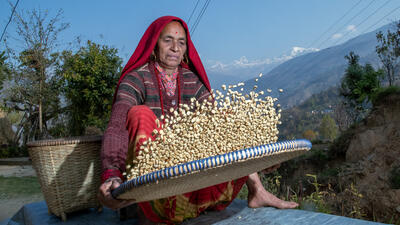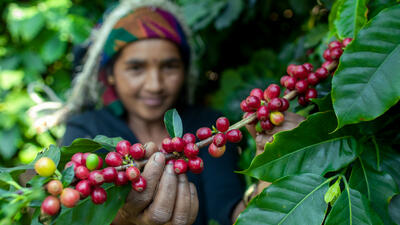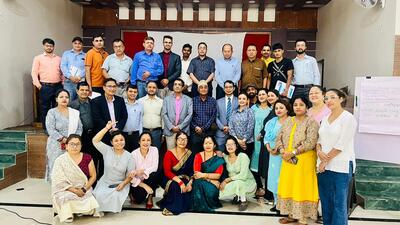


Making Nepal’s specialty coffee sector competitive
ITC trains small coffee businesses in Nepal on export management to compete in international markets ahead of least-developed-country graduation
Bisho Prasad Adhikari, a coffee farmer from the far-flung Lumjung district of Gandaki Province in Nepal, decided to leave aside his daily activities to spend three days learning alongside trade experts and senior government officials about the prospects and techniques for exporting Nepali specialty coffee to international markets.
Adhikari, who is also the district’s president of the Nepal Coffee Producers Association, traveled 70 km to the provincial capital of Pokhara where he joined a training on export procedures, trade facilitation reforms and facilities, incentives for exports available in Nepal, international market requirements, quality standards, market analysis and national sources of trade information.
Overall, the residential workshop looked at the trade competitiveness and compliance capacity of Nepalese micro, small and medium-sized enterprises in the coffee sector that are connected or wish to connect to international markets.
The trade capacity of small business is vital for Nepal’s transition from being a least developed country by 2026, when the country will lose various privileges offered by key international markets.
Adhikari was among the 26 cohorts in coffee farming, including 10 women, who benefitted from the training that was organized by the International Trade Centre (ITC) under the European Union-funded EU-Nepal Trade and Investment Programme (TIP), in collaboration with the Trade and Export Promotion Centre (TEPC) and the Ministry of Industry, Commerce and Supplies (MoICS).
The training is one of the latest in a series of initiatives to boost Nepal’s exports.
“It was a great opportunity for coffee farmers like me to learn about the international market trends, opportunities and prospects for Nepali coffee. The training has boosted our confidence to reach out to international buyers and seek new opportunities,” Adhikari said.
Maya Tiwari, a female participant from Syangja, another leading coffee district, found the training fruitful for both coffee farmers and traders.
“Unlike previous trainings where we learned only about techniques of modern farming and processing of coffee, this training was insightful and instrumental to explore new opportunities in international markets and comply better with export procedures,” said Maya, who is also the manager of the Coffee Farmers’ Cooperative in the district.
Most of the participants shared their plans to multiply the knowledge they acquired during the training through various upcoming training events in their respective districts.
“The training provided a solid platform to learn and build our knowledge. I am planning to share what I learned with fellow farmers in my district who have not had the chance to join such trade capacity building,” Maya added.
The participants also shared their pain points and concerns during the training, as high-level government officials were present who are responsible for addressing issues in the sector.
For instance, Adhikari explained that the market in Nepal was flooded with imported coffee, which was not only of lower quality but also available at far cheaper prices compared to their Nepali specialty coffee.
“We want the government to support us with reasonable incentives so that our competitive strength and production capacity can be boosted,” said Adhikari. “There is potential to produce coffee on 1.2 million hectares. However, currently, the country’s coffee farming area covers only 2,600 hectares. International demands far exceed our production capacity,” he added.
The government’s data shows that Nepal produced only 356 tonnes of Nepali specialty coffee during the years 2020/21.
Toyam Raya, Secretary at the MOICS said: “The government is geared towards promoting small businesses through the entire coffee value chain. We will take initiative to address the concerns raised by the entrepreneurs through the government’s upcoming annual budget.”
About the project
The EU-funded four-year Trade and Investment Programme was launched in February 2020 and assists the Government of Nepal in achieving sustainable and inclusive economic growth and poverty reduction by increasing trade and participation in regional and global value chains. Implemented by the International Trade Centre (ITC), the project also provides assistance to the sustainable and inclusive development of Nepal’s coffee and pashmina value chains, with a focus on export development.















